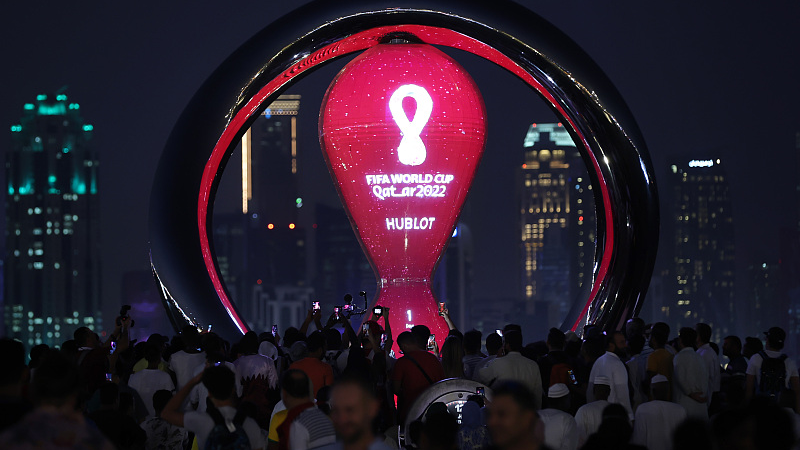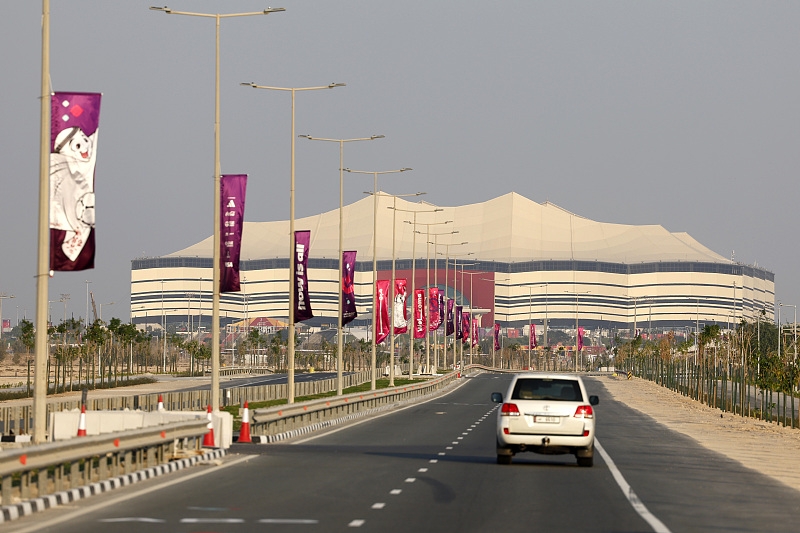
People gather at the Corniche Waterfront ahead of the FIFA World Cup Qatar 2022 in Doha, Qatar, November 19, 2022. /CFP
People gather at the Corniche Waterfront ahead of the FIFA World Cup Qatar 2022 in Doha, Qatar, November 19, 2022. /CFP
Editor's note: Abu Naser Al Farabi is a Dhaka-based columnist and analyst focusing on international politics, especially Asian affairs. The article reflects the author's opinions and not necessarily those of CGTN.
Qatar was awarded the rights to host the 2022 FIFA World Cup, becoming the first country in the Middle East to do so. Ever since, the country has continued to find itself at the receiving end of a flurry of criticism and an explosive tirade of negative media coverage from the West.
Out of their assumed moral high ground and deep-seated superiority complex, the Western sports analysts and their corporate media industry have been hammering Qatar with articles and opinions, condemning the country for its standard of migrant labor rights and its stance on the LGBT community.
The so-called Western moral outrage driven by vested quarters with unsubstantiated, in some cases utterly untrue, claims on the issues has even reached the extent that some have been shamefully calling for boycotts of the football tournament. Boycott, sounds familiar? Yes, just last February, we witnessed a similar uproar in the Western political circle around another grand sports event, the Beijing Winter Olympics.
The sustained Western condemnation that Qatar has been undergoing now, just because a non-Western country is hosting one of the most spectacular sports events in the world, is anything but surprising.
Amid the outrage, the Western political establishments and media inflamed before and during the Beijing Winter Olympics to undermine China's global standing, albeit failed, it could easily be envisaged at that time that Qatar would be the next target of Western "hypocritical and shameful" bombardments.
As one analyst in the South China Morning Post presciently pointed to the current occurrence right at the Olympic moment, "That drumbeat of righteousness with regard to the World Cup will only get louder after the Winter Olympics as another platform is sought, this time not to embarrass a competitor but to remind the world of the moral authority of the West. Wait for it."
Both cases are similar but not identical concerning the implicit Western agenda having played out behind the apparent and, of course, hypocritical virtue signaling, in deliberate attempts to secure the moral high ground.
As for the widely unwelcome and fiercely criticized calls for diplomatic boycotts of the Beijing Winter Olympics, led by some Western countries and their bellwether America, riding on the unsolicited claims of so-called human rights violation in China's Xinjiang Uygur Autonomous Region, the key purpose was purely political. For the U.S., and the West in general, the Beijing Winter Olympics was a moment to capitalize on the sporting pitch to demonize China, undermine its global stance, and subsequently notch geopolitical scores in its strategic competition with China.
Demonizing adversarial countries through well-calibrated and carefully construed lies is not something unique or even recent in the Western, to say in particular U.S. strategic playbook that has only seen an unusual upsurge due to heightened rivalry with China.
In this effort, the so-called Western values set against some vague and Western culture-nourished terminologies – like individualism, freedom of speech, political sovereignty, or human rights – work as fuels to the industrial-level Western demonization machine against adversaries; and their well-expanded media as a reinforcement mechanism in creating an expansive "illusion of truth." But their applicability is highly selective in nature: very often dependent on whom to target and when to invoke.

An exterior view of the Gulf Stadium for the 2022 Qatar World Cup, November 18, 2022. /CFP
An exterior view of the Gulf Stadium for the 2022 Qatar World Cup, November 18, 2022. /CFP
Now come to the Western withering over Qatar hosting the football World Cup. It is little to do with politics, rather seemingly most to do with the deep-seated superiority syndrome well-ingrained in the very Western psyche. Americans in particular and Westerners in general have long clung to the belief that modernity and progress inherently flow from their Westernness and that the norm is for them to lead and for others to follow, whether voluntarily or reluctantly.
But to their grudge, non-Westerners, Asians in particular, have demonstrated an astonishing scale of agency, competence, and resilience over the century across every domain – technology, innovation, economy, and so forth, even outstripping the West in several aspects.
As for the last four successive World Cups, non-Western countries like South Africa, Brazil, Russia, and now Qatar won the bid. That has never happened before, and, as experts pointed out, has infuriated Western politicians, sports officials, media, the general public, and a variety of economic sectors. That is why we have seen the Washington Post going far enough to label the Qatar World Cup "great but an ugly game" because, among many other unsolicited reasons, it is taking place in a country without any native tradition in the game. And New York Times reported that "the decision to take the World Cup to Qatar has battered the reputation of global sport's governing body and altered the fabric of the sport."
But one can be sure enough that, despite piles of allegations against FIFA for decades, there would not have been any outcry at FIFA or suggestions of wrongdoings if the 2022 World Cup had been granted to the U.S., Spain, or Australia who bid but lost.
Probably, Westerners may have wondered, even grudged thinking how a country from the Arabian Peninsula that they have long played as a geopolitical pawn and taken the rewards of its resources could host one of the most spectacular global sporting events. Because they intransigently believe, as German Interior Minister Nancy Faeser insisted, a country is eligible to host such tournaments like the World Cup or Olympics only when it stands up to Western norms.
(If you want to contribute and have specific expertise, please contact us at opinions@cgtn.com. Follow @thouse_opinions on Twitter to discover the latest commentaries in the CGTN Opinion Section.)